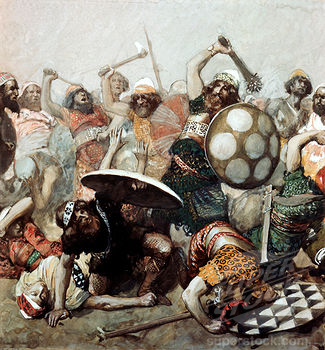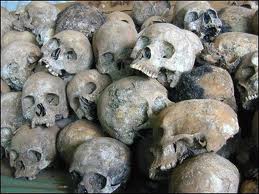 This is a summary post from much of what I have been writing over the past two weeks or so about the violence of God in the Old Testament. The reason I am summarizing it is because I want to begin looking at some of the key biblical passages which are affected by my proposal to see how we can read and understand these texts.
This is a summary post from much of what I have been writing over the past two weeks or so about the violence of God in the Old Testament. The reason I am summarizing it is because I want to begin looking at some of the key biblical passages which are affected by my proposal to see how we can read and understand these texts.
I know that most of your questions and objections to this view have not been answered, but hopefully as we look at some the key texts of Scripture, what I am proposing will make more sense.
So here is the summary…
Violence of God in Light of the Love of Jesus
When we read about God telling Israel to go slaughter men and women, the natural, right, and godly response is to read such depictions with revulsion, loathing, and disgust. Neither Jesus nor God ever wanted such things to occur. Jesus never laid a hand on anyone to harm or hurt them, nor did He ever command His disciples to do anything of the sort. To the contrary, Jesus always helped, healed, comforted, restored, fed, loved, and forgave, and He always commanded His disciples to do the same.
In previous posts (see the list below), I have argued that since Jesus fully reveals God to us, we can also be certain that God never actually commanded the Israelites to kill and destroy, or to go to war with their enemies. But when Israel set out to do these things, God took the blame for their actions by inspiring the biblical authors to lay the guilt fully in His hands. The violent things that God commanded the Israelites to do in the Old Testament were not actually His will or His commands. The Israelites set out to do such things because this is how nations and countries behaved at that time (and still sometimes today). When God saw that their heart was set on doing these things, God issued the command for it to happen so that later generations could lay the blame for these bloody deeds directly on God Himself.
Though God is not directly guilty for these actions, He knows that He is indirectly responsible, for He created a world where these sorts of actions are possible. So He takes the blame by commanding human agents to carry out the violent actions which they had already set their hearts and minds to doing.




 God is an eternal ocean of grace, mercy, love, and righteousness and knows that no amount of sin can diminish or overcome His holiness. Sin does not taint God, but rather, God soaks up all sin. When, in the person of Jesus Christ, God steps into the evil of the world, it does not overpower Him, but He overcomes it.
God is an eternal ocean of grace, mercy, love, and righteousness and knows that no amount of sin can diminish or overcome His holiness. Sin does not taint God, but rather, God soaks up all sin. When, in the person of Jesus Christ, God steps into the evil of the world, it does not overpower Him, but He overcomes it.
 I have been saying in my posts on the violence of God that God inspired the biblical writers to say that He told them to do the violent things they did, even though He did not. The reason God did this was to take their sin upon Himself. Just as Jesus became sin for us (2 Cor 5:21), so God became sin for Israel. This doesn’t mean God became guilty, nor does it mean that God became a sinner. It simply means that God took their guilt upon Himself just as Jesus did upon the cross. To read more about this line of thought, see the list of posts at the bottom of this article.
I have been saying in my posts on the violence of God that God inspired the biblical writers to say that He told them to do the violent things they did, even though He did not. The reason God did this was to take their sin upon Himself. Just as Jesus became sin for us (2 Cor 5:21), so God became sin for Israel. This doesn’t mean God became guilty, nor does it mean that God became a sinner. It simply means that God took their guilt upon Himself just as Jesus did upon the cross. To read more about this line of thought, see the list of posts at the bottom of this article.

 Another great icebreaker is to take a friendly dog along as you walk the neighborhood.
Another great icebreaker is to take a friendly dog along as you walk the neighborhood. Some neighborhoods have trash that builds up in various empty lots or along the sides of the streets. As you walk, carry a garbage bag to collect any stray garbage lying around. This not only helps improve the appearance of your neighborhood and cleans up the environment, but is another way to break the ice with your neighbors.
Some neighborhoods have trash that builds up in various empty lots or along the sides of the streets. As you walk, carry a garbage bag to collect any stray garbage lying around. This not only helps improve the appearance of your neighborhood and cleans up the environment, but is another way to break the ice with your neighbors.


 Today is my 15th Wedding Anniversary!
Today is my 15th Wedding Anniversary!

 It is on the cross that Jesus put to death the violent portrayal of God in the Old Testament and revealed once and for all that God is not like that. It is on the cross where Jesus revealed what God is really like: He is loving, kind, forgiving, and would rather take the blame for the sins of His children than accuse and condemn them for misusing and abusing the freedom He gave.
It is on the cross that Jesus put to death the violent portrayal of God in the Old Testament and revealed once and for all that God is not like that. It is on the cross where Jesus revealed what God is really like: He is loving, kind, forgiving, and would rather take the blame for the sins of His children than accuse and condemn them for misusing and abusing the freedom He gave. How can a God who says "Love your enemies" (Matthew 5:44) be the same God who instructs His people in the Old Testament to kill their enemies?
How can a God who says "Love your enemies" (Matthew 5:44) be the same God who instructs His people in the Old Testament to kill their enemies?

 In previous posts I have suggested that
In previous posts I have suggested that 
 This post continues my attempt to “think by writing” about
This post continues my attempt to “think by writing” about
 Do you know someone who is mourning a great pain or tragedy? Maybe they lost a parent, a spouse, or a child. Maybe they contracted a terminal illness. Maybe their house burned down or they lost their job.
Do you know someone who is mourning a great pain or tragedy? Maybe they lost a parent, a spouse, or a child. Maybe they contracted a terminal illness. Maybe their house burned down or they lost their job.